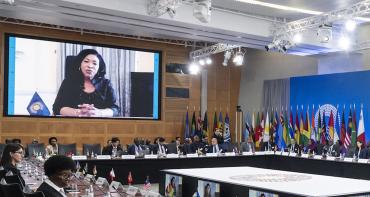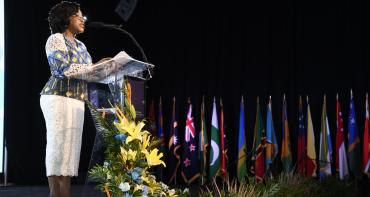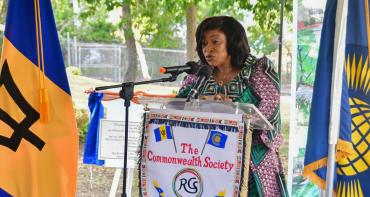Commonwealth Secretary-General Patricia Scotland has called for increased funding to help member states rebuild their countries after natural disasters.

Commonwealth Secretary-General Patricia Scotland has called for increased funding to help member states rebuild their countries after natural disasters.
She was speaking at the Caribbean Community (CARICOM) and United Nations Development Program’s (UNDP) side event at COP23 in Bonn, Germany, today.
“We have to mobilise international commitment to ensure that there is sufficient funding for climate resilience to be embedded into all restoration, rebuilding and developmental planning,” said the Secretary-General. “The global community must step up and engage cooperatively with establishing new sources and means for providing financial and technical support.”
Secretary-General Scotland recounted to delegates how shocked she was to see the ‘dreadful damage’ inflicted by Hurricanes Irma and Maria, both Category 5 storms, when she visited the Caribbean last week.
“Precious lives have been lost and the livelihoods of people destroyed. I met a woman sitting in the rubble where her house once stood. She had nothing left except a mattress and fridge.
“It will take a very long time and huge financial resources to rebuild and make things functional again. Disruption to essential social services including health and education are still to be restored.”
The Secretary-General said that we were witnessing an increased number of storms and hurricanes in the region, both in the frequency and intensity. Climate scientists, she said, were suggesting that such exceptional patterns may become the norm for the region. The Secretariat was ready to help, said Secretary-General Scotland.
“To this end, our Commonwealth Climate Finance Access Hub is now fully functional and already engaged with many countries of the region. Our goal is for the hub to provide technical support to small and vulnerable Commonwealth states and address capacity gaps that hinder access to international sources of climate finance.
“We have already supported Antigua and Barbuda, Barbados, Jamaica, Mauritius, Namibia, Swaziland and Vanuatu. Access to adequate and reliable long-term financing is a key determining factor in building resilience.”
And she said that one of the main priorities should be to ensure that members states were resilient to climate change.
“This change is real, and this change is now. We see Resilient Development as the end product, and the Regenerative Model of Development as the means of attaining it,” said the Secretary-General. “The Regenerative Model of Development uses resources to improve society’s well-being in ways that build the capacity of the support systems needed for future growth and prosperity. It focuses on competence, efficiency and innovation to both mitigate and adapt to climate change.”
Two Commonwealth prime ministers backed the Secretary-General’s vision. Speaking after the event, the prime minister of Grenada and chair of CARICOM, Keith Mitchell said, “Well, clearly she has been a friend of the region in every respect and some of the points she raised today, in all aspects of development, is something we’re certainly going to follow.”
Dr Mitchell said he hoped it was an idea which could be discussed at the Commonwealth Heads of Government Meeting (CHOGM) in London next April and was echoed by Saint Lucia’s prime minister, Allen Chastanet.
“Any development goals that we have that can’t redound to the benefit of an individual person is not going to be viable,” he said, “and so the idea that all these programmes and policies have to be interconnected is very important. The Commonwealth Secretariat has a huge opportunity which is the meetings coming up in April.”



